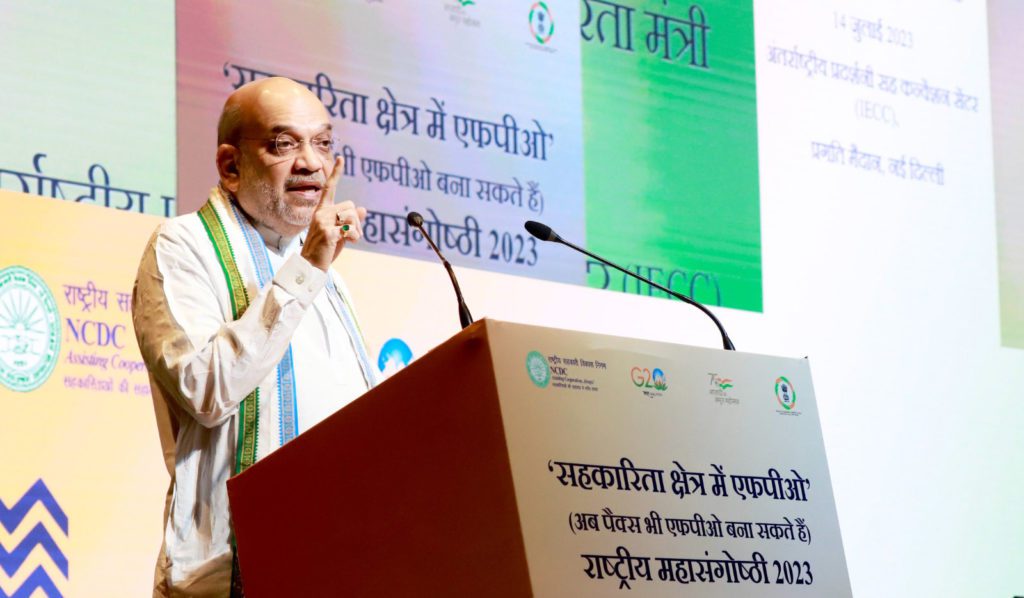Drawing a neat difference between FPOs under cooperatives and FPOs under companies or in private hands, Union Home Minister and Minister of Cooperation, Amit Shah explained how under co-ops the benefits of FPOs would accrue to masses and farmers. Shah was addressing a mega Conclave on FPO in the cooperative sector and released the action plan for formation of 1100 new FPOs by PACS under the aegis of NCDC in New Delhi on Friday.
On this occasion Union Minister of Agriculture and Farmers Welfare Narendra Singh Tomar, Union Minister of State, Ministry of Cooperation, BL Verma, Secretary, Ministry of Cooperation, Gyanesh Kumar and Secretary, Ministry of Agriculture and Farmers Welfare, Manoj Ahuja were also present on the dais while people connected to FPOs could be seen sitting in the audience.
In his address, Shah said the cooperative movement can make a significant contribution towards strengthening the country’s 65 crore people associated with agriculture and making them prosperous by combining their small capital through cooperatives and turning it into a big capital.
Detailing the idea of PACS conversion into FPOs, Shah recalled his meeting with Agriculture and Farmers Welfare Minister Narendra Singh Tomar where it was decided that to begin with NCDC would oversee the conversion of 1100 PACS into FPOs. “But this is only a tentative number as any PACS can decide to convert into PACS and take various rebates available to them”, added Shah.
Shah also struck a note of urgency saying such lucrative govt schemes would not last forever and PACS should try to convert into FPOs for the benefit of their members. “In the cooperative sector, FPO and its benefits have reached a very limited amount and this happened because we did not fix the targets to achieve the goal”, Shah underlined.
The Minister said that if PACS becomes an FPO, then the benefits of FPO will reach all the farmers of PACS. He said that FPOs formed through PACS have the maximum potential to make the farmers prosperous. In the coming days, the Ministry of Agriculture and the Ministry of Cooperation will work together with the mantra of a three-pronged rural development and prosperity through PACS, FPOs and SHGs. He said that if PACS want to become FPOs then NCDC can help them and there is no limit for this and this conclave will further speed up the cooperative movement in the country.
Amit Shah said that agriculture, animal husbandry and fisheries-based economic activities make up 18 percent of India’s GDP and strengthening them means strengthening the country’s economy. He said that if GDP increases through manufacturing, then the employment figures do not increase that much, but if agriculture, animal husbandry and fisheries are strengthened through cooperatives, then along with GDP, employment opportunities will also increase.
FPO was conceived in 2003 by the Yogendra Alagh Committee during the time of Prime Minister Shri Atal Bihari Vajpayee. When Shri Narendra Modi became the Prime Minister of the country, he decided to implement the suggestion of FPO, revealed Shah. Shah said that the magnitude of this initiative is that today 11,770 FPOs are working in the country and it is through these that lakhs of farmers of the country have been successful in increasing their income.
He said that it was announced in the budget to set up 10,000 FPOs and the target is to achieve this by the year 2027 and Rs 6900 crore was allocated to achieve this goal. The idea is that the entire system from input to output, from manufacturing to processing and grading and from packaging to marketing and storage, should be under FPOs. Shah said that procurement of inputs, market information, dissemination of technology and innovation, aggregation of inputs for production, facilities for storage, drying, cleaning and grading have been done by FPOs.
FPOs have also made arrangements for brand building as well as packaging, labelling and standardization processes, quality control, getting higher price to the farmer by associating with institutional buyers and corporate houses. FPOs have also become the medium for dissemination of the schemes by informing the farmers about all the government schemes.
The minister called upon all the FPOs of the country to continue working in the same manner, but also to keep integrating PACS alongside. He said that a new hybrid model should be designed so that a complete system for information exchange, profit sharing and marketing based on the arrangement between PACS and the FPOs can be put in place.
Shah said that the government under the leadership of Prime Minister Shri Narendra Modi has provided loans of over Rs 127 crore to FPOs so far, which is in addition to Rs 6,900 crores. In tribal districts, 922 FPOs have been formed for work related to the forest produce. He said that the states of Gujarat, Maharashtra, Uttar Pradesh, Rajasthan and Punjab have done excellent work in the field of FPOs.
Shah said that we have to establish amongst youth that agriculture is a profitable business, and it needs to be practiced in a modern way with proper marketing. He said that if such confidence is instilled in the 12 crore farmers of the nation, then not only will agricultural production increase, but also the contribution of agriculture to the GDP will increase. It will also not only make these 12 crore farmers self-reliant but the nation will also become self-reliant.
Shri Shah said that Prime Minister Shri Narendra Modi has taken many initiatives in this regard and now through cooperative FPOs, the Modi government will move forward in the direction of making farmers into businessmen and entrepreneurs.
